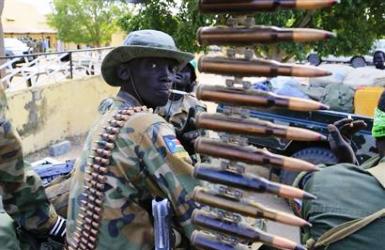SPLM-IO accuses Juba of attempting to regain territories from opposition fighters
September 9, 2015 (ADDIS ABABA) – The armed opposition faction of the South Sudan’s ruling Sudan Peoples’ Liberation Movement (SPLM-IO) led by former vice president, Riek Machar, has accused president Salva Kiir’s government of attempting to regain control of the rebel-held territories in violation of the permanent ceasefire provided for in the peace agreement signed by the two parties on 17 and 26 August to end the 20-month long civil war.

SPLM-IO said the government has been on offensive for the past two weeks against their bases in Jonglei, Unity and Upper Nile states, with the latest heavy fighting around rebel-controlled areas near Malakal in the Shilluk Kingdom in which government forces have been using attack helicopter gunships to regain control of rebel-held areas.
“We have been under attack by forces from the regime in Juba even before the peace agreement was signed. They have been attacking our bases in Unity, Jonglei and Upper Nile states in flagrant violation of the ceasefire and the peace agreement,” Machar’s spokesperson, James Gatdet Dak, told Sudan Tribune on Wednesday.
However, spokesperson for the South Sudan army (SPLA), Colonel Philip Aguer, announced on Wednesday evening on the state-run South Sudan TV (SSTV) that rebel forces were amassing troops to attack the city of Malakal at the night of Wednesday.
He accused the SPLM-IO of attempting to recapture Malakal in violation of the ceasefire deal which came into force on 29 August.
But the rebel leader’s spokesman said their forces were only fighting in self-defence by resisting the government’s attempt to capture their bases on the west bank of the River Nile, saying it is the government that crossed over to their territories using both ground and air attacks for the past six days.
Dak said the intention of the government was to recapture the areas around Malakal and declare them in the expected military workshop as their territories when territories and assembly areas of rival forces will be declared.
“We suspect that the intention of forces of Salva Kiir is to regain control of our bases around Malakal so that they can come to the expected workshop in Addis Ababa on ceasefire and security arrangements and declare them as their territories. They want IGAD mediation to record the areas as theirs if they succeed in capturing them. We will not allow this to happen,” Dak further explained.
He also said he suspected that because Malakal town will be secured by a joint force from the two rival armies and police, the government wanted to regain control of the rebel military bases around the town.
He said SPLM-IO had no intention to recapture Malakal town, saying they respected the ceasefire and that their contingent of forces will enter the town through implementation of security provisions in the peace agreement.
Dak however said government forces were repulsed from all directions around Malakal and forced to retreat back into the town on Tuesday and Wednesday.
He called upon IGAD and the wider international community to exert pressure on president Kiir’s government to respect the terms of the peace deal.
Observers say divisions continue to exist in the government with senior political and military leaders opposing the peace agreement and suspected to be behind the violations.
United Nations Mission in South Sudan (UNMISS) also confirmed that government helicopter gunships were attacking rebel positions on the west bank of the Nile.
President Kiir this week admitted that his forces had been violating the peace deal and warned officers in the army of punitive measures against them, but no action has been taken.
Among those who publicly rejected the accord is the powerful chief of general staff, Paul Malong Awan, who is believed to be more influential in the army than president Kiir.
The two warring parties are expected to endorse the peace agreement this week and begin a workshop on ceasefire and security arrangements during which they will declare the size of their respective armies and current territories of control.
They will also tackle and agree on number of presidential guards to be stationed in Juba, joint police forces and soldiers to provide security in the city and other state capitals and protect barracks, bases and warehouses in the national capital.
(ST)
